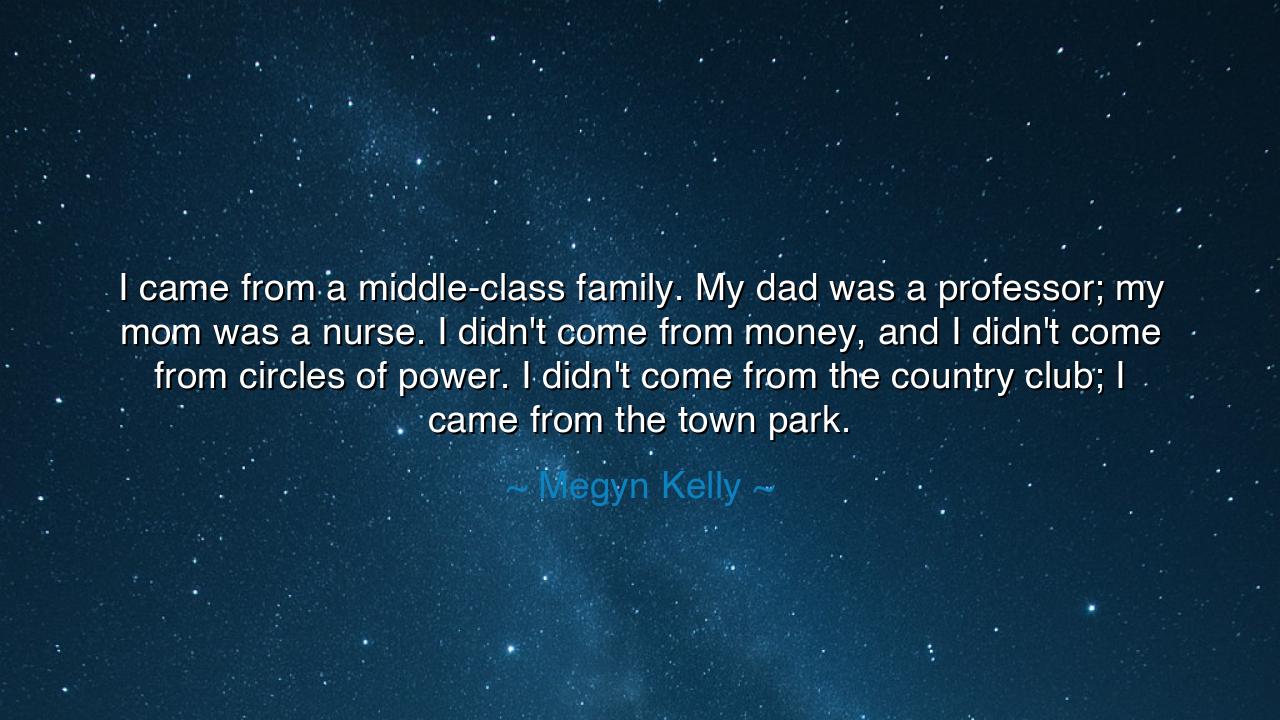
I came from a middle-class family. My dad was a professor; my mom
I came from a middle-class family. My dad was a professor; my mom was a nurse. I didn't come from money, and I didn't come from circles of power. I didn't come from the country club; I came from the town park.






In the words of Megyn Kelly, “I came from a middle-class family. My dad was a professor; my mom was a nurse. I didn’t come from money, and I didn’t come from circles of power. I didn’t come from the country club; I came from the town park.” These words, simple yet luminous, are a hymn to humble beginnings, to the quiet strength of the ordinary, and to the greatness that can arise not from privilege, but from perseverance. Kelly’s reflection is not a lament but a declaration — a statement that true power does not come from birthright, but from the unyielding will to rise beyond one’s circumstances. Hers is the voice of those who build their own ladders in a world of inherited towers.
The origin of this quote lies in Kelly’s recollection of her upbringing in a modest home in New York. Her father, a professor, taught not wealth but wisdom; her mother, a nurse, practiced compassion more valuable than gold. In those two lives — one devoted to the mind, the other to healing — she found her foundation: education, diligence, and empathy. When she says she came from the “town park” rather than the “country club,” she speaks to the contrast between the world of leisure and the world of effort — between those born into comfort and those who must carve their own path with grit and faith. Her words carry the ancient truth that character is the true inheritance of the poor and the striving.
The “town park” in her imagery is more than a place — it is a symbol. It is the soil of the common people, where children learn through play, through failure, through laughter that costs nothing. It is the ground where dreams are first spoken aloud without shame, where ambition is not assumed but earned. In the park, one learns the language of endurance — the willingness to wait one’s turn, to fall and rise again, to work without applause. It stands in opposition to the “country club,” that quiet fortress of exclusion and advantage, where the path to success is paved before the journey begins. Kelly’s declaration, then, is both humble and defiant: a reminder that the town park produces not merely citizens, but fighters, innovators, and dreamers.
Throughout history, those who have changed the world rarely came from the marble halls of privilege. Abraham Lincoln split rails before he shaped a nation; Socrates walked barefoot through the streets of Athens, teaching wisdom without coin; Mother Teresa tended to the dying in the gutters rather than ruling from the palaces of the wealthy. Like Kelly, they came not from “circles of power,” but from the circles of struggle, where empathy is born and resilience is forged. Their greatness was not granted — it was grown. From their ordinary soil rose extraordinary lives, proving that destiny is not written by fortune, but by the courage to begin small and to keep going when the path narrows.
Kelly’s words also remind us of the value of roots — of remembering where one comes from, even after one has climbed high. The middle-class home, the public park, the long hours of parents who labor without glory — these are not burdens to escape, but blessings to carry. They ground the soul in reality and teach humility amid success. Those who forget their beginnings often lose themselves in the glitter of achievement, becoming hollow in the pursuit of status. But those who remember — who still hear the laughter of the town park in their hearts — remain anchored in truth and alive with gratitude.
The lesson here is one of both pride and perseverance. Never believe that greatness belongs only to the privileged or the powerful. The world’s strongest foundations are built not on wealth, but on work; not on connection, but on conviction. Whether you were born in a mansion or in a small home, what matters is not where you start, but how you move. Take what your beginnings have given you — your patience, your honesty, your hunger — and wield them like tools of creation. If the gate to the country club is closed, build your own door in the park, and let others in through it.
So, my children of the present age, remember Megyn Kelly’s truth: it is not shameful to come from the town park — it is sacred. It is there that humility and resilience dwell together, that dreams are born without entitlement, and that the human spirit learns to soar without wings. Do not envy those who inherit the world; become one who earns it anew. For the measure of a person is not the luxury of their origin, but the light of their effort. And when you rise, as she did, look back upon your park, your home, your roots — and know that the soil that shaped you was never common, but holy.






AAdministratorAdministrator
Welcome, honored guests. Please leave a comment, we will respond soon